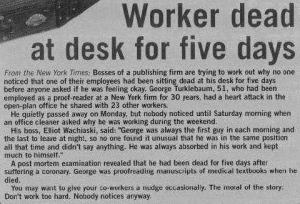 Donny Deutsch’s cable program, “The Big Idea,” features interviews with entrepreneurs who scored big (or are trying to) in the world of business. The guests discuss their “big idea,” the one that makes their company or product different from all the rest.
Donny Deutsch’s cable program, “The Big Idea,” features interviews with entrepreneurs who scored big (or are trying to) in the world of business. The guests discuss their “big idea,” the one that makes their company or product different from all the rest.
In the crowded, competitive world of business, a big idea can propel a company from the depths of obscurity to the heights of financial success. But the big idea isn’t necessarily a new invention or a revolutionary concept. More often, it is a new spin on an old idea that capitalizes on a current trend (e.g., “fast food” restaurants that serve nothing but breakfast cereal).
Allstate Insurance company is running ads that promise to pay cash rebates for every six months of good driving. That’s nothing more than a new way of offering a good driver discount but in my view, it qualifies as a big idea because instead of a discount, the customer gets paid. Getting a check from your insurance company every six months re-sells you on staying with that company because you don’t want to lose “your” check. (It also reminds you to drive safely.)
Amazon’s latest big idea is low priced tablets. They don’t do everything an iPad does but they will probably appeal to a big segment of the market that will pay $200 (or less) but not $500 (or more).
How could you create a big idea in your practice? It might be as simple as taking something every attorney in your market does (e.g., house calls), and re-positioning it (e.g., “We’ll send a limo to pick you up”). It might be something few attorneys do, like the radio spot I just heard by an estate planning firm that prepares living trusts. Their big idea: “free lifetime updates”.
Take some time to brainstorm ideas with your employees or mastermind group. What do you do that everyone else does that you could promote as “your big idea”? Or, what do you do (or could you do) that nobody else does that could be an even bigger big idea?














